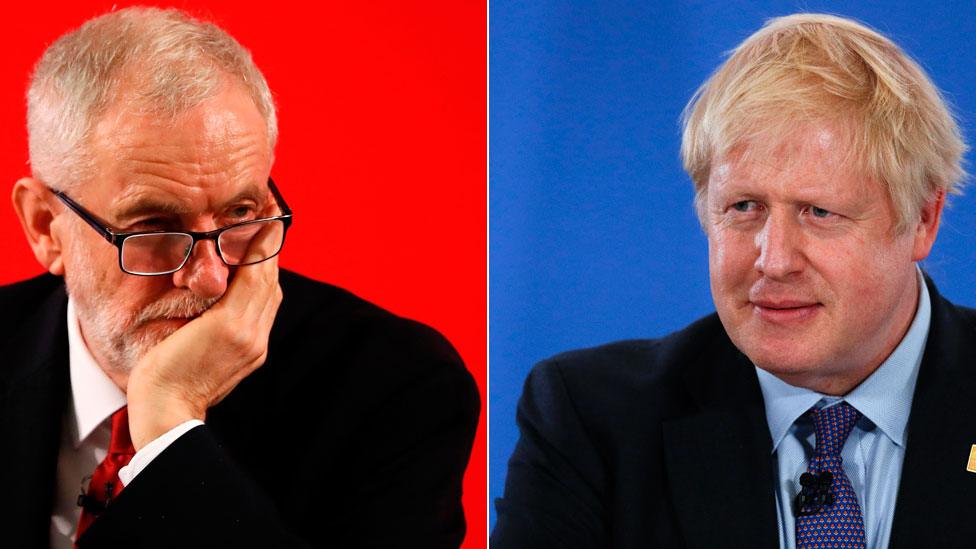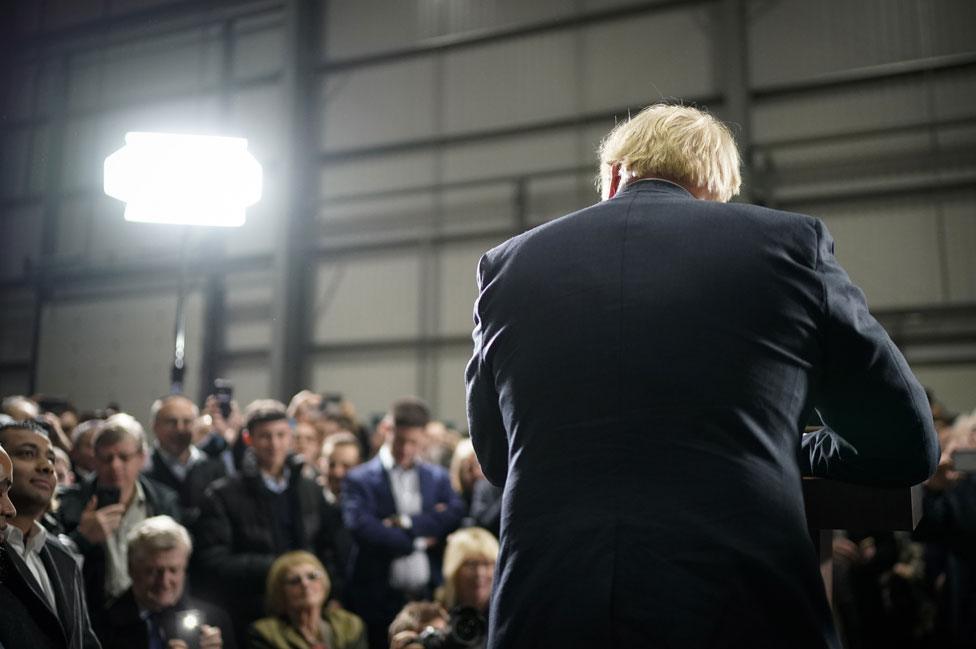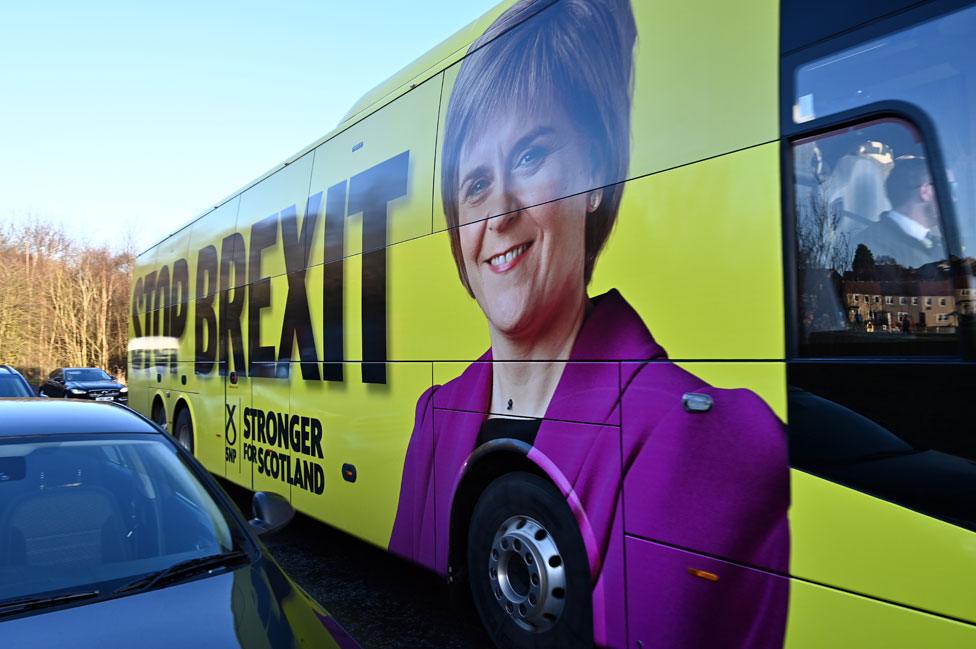General election 2019: Why this UK vote is a huge deal
- Published

The personalities of Corbyn and Johnson have dominated the campaign
As British voters head to the polls for a defining general election - the third in four years - they face a difficult choice, involving two unpopular leaders.
Or as Nick Boles, a former Conservative MP, views it, an "appalling choice" between a "compulsive liar" and a "totalitarian".
The former - in Boles' opinion, external - is Conservative Prime Minister Boris Johnson. The latter is Labour Party leader Jeremy Corbyn.
It's as if the 2016 US presidential election, where both major candidates were deemed flawed and untrustworthy, is playing itself out again three years later, on the other side of the Atlantic.
"People are cynical and saying that they're fed up on the doorstep," Mary Roberts, a Labour candidate in the north Wales constituency of Ynys Mon, told supporters at a rally on Sunday. "That makes it difficult sometimes."
Canvassers and activists in the crowd echoed that sentiment. Voters want all of this - Brexit, the election, the nonstop drumbeat of political chaos - to be over and done with.
Welcome to the 2019 general election, a pre-Christmas present few British voters seem anxious to unwrap.

Johnson's trust issue
This is Johnson's first chance to stand before the British voters as the nation's prime minister. It's an election he asked for, yet the campaign hasn't been without its bumps in the road.
Critics have raised doubts about his trustworthiness - an important question, given that Johnson is trying to assure voters that he can get the UK out of the European Union by the end of January and then follow that up with successful negotiation for a new trade relationship.
They cite a string of broken promises or misleading statements, including on healthcare and his Brexit plan for Northern Ireland. He has also been criticised for refusing to discuss the number of children he has, an issue that was even picked up in the US media, external.
"The theme running through our questions is trust," BBC broadcaster Andrew Neil said of an interview he had hoped to conduct with Johnson. "And why, so many times in his career in politics and journalism, critics and sometimes even those close to him have deemed him to be untrustworthy."
Johnson declined an election interview on Neil's programme - the only candidate to do so in recent elections. He also declined to appear at a climate debate, and instead was represented by a melting block of ice.

Johnson has at times evaded the spotlight
Even Nigel Farage, the leader of the Brexit Party, hasn't hesitated to employ his dagger.
"I've known Boris on and off for 25 years, and he is a likeable, entertaining personality, he said. "Would you absolutely trust him? No."

A viral moment
Perhaps most damaging to Johnson in the final days of the campaign was the publication on Monday of a photograph of an ill four-year-old boy, admitted to a Leeds hospital emergency room, lying on a pile of coats because there were no available cots.
The image, which went viral on social media, has put the Conservatives on their heels, as they apologise for the child's ordeal and defend themselves against charges that the incident was indicative of an underfunded health system.
Johnson responded with a halting interview with an ITV reporter. He initially refused to look at a photo of the child on the reporter's phone, taking the device away and putting it in his own pocket, saying he would "study it later".
His behaviour could reinforce the perception that the prime minister is not always well equipped to handle criticism and sometimes struggles to display empathy.
Corbyn pounced, saying the Conservatives have had "nine years in office, and whilst they now claim they are funding the NHS, they are not; they're not even beginning to make up the shortfall it's had over the past nine years."

CONFUSED? Our simple election guide, external
MANIFESTO GUIDE: Who should I vote for?, external
POSTCODE SEARCH: Find your local candidates, external


Corbyn's credibility and ideology
The Labour Party leader isn't free from his own personal criticisms, however. His mixed and contradictory messages on Brexit - refusing to make Labour an avowedly Remain party - have undermined his credibility.
Given the party's delicate position of trying to represent constituencies that voted strongly to Leave and others that were vehemently Remain, Corbyn has tried to straddle the line between the two sides - but seems to have angered some on both sides.
However, following him in North Wales this week, he rarely brought up the subject, preferring to talk about his promise to invest in the health service.

Corbyn is popular with the grassroots but has not been in step with them on Brexit
He has also been accused of inadequately addressing anti-Semitism with his party's ranks, of pushing out moderate voices within the party and of previously harbouring sympathies for the IRA.
Johnson was quick to bring this last point up in the final leader debate on Friday, as a means of deflecting Corbyn's criticisms of Johnson's proposed solution to the seemingly intractable problem of withdrawing the UK from the EU while keeping the border between Northern Ireland and the Irish Republic seamless.
The Labour manifesto reflects Corbyn's socialist sympathies - and has opened him up to attack from moderates, as well. He has called for higher taxes, a nationalisation of industries like mail, water and energy and a four-day work week, among other proposals.

A Brexit election
History books will probably remember this as the Brexit election.
Johnson himself took over the top job earlier this year only after his predecessor, Theresa May, repeatedly failed in her efforts to pass a withdrawal deal. Because of this, the Conservatives are campaigning on a "Get Brexit Done" slogan - an effort to pry away dozens of longtime Labour constituencies that voted Leave.
More than that, however, Johnson's campaign is centred on his desire to win a working Conservative majority in Parliament for the first time since 2017. Everything, he says, hinges on that - Brexit, new trade deals with the EU and US, a tax cut and increased spending on the National Health Service and education.
UK-US relations are a precarious matter for Johnson - a "special relationship" fraught with potential and peril.
US President Donald Trump is largely unpopular in the UK. His feud with London Mayor Sadiq Khan, intemperate tweets about UK politics and vitriolic treatment of a British ambassador to the US have helped make him persona non grata for many Britons.
Jeremy Corbyn and his Labour Party have sought to exploit Johnson's perceived closeness to the US president, suggesting that US access to the British health system was "on the table" in trade talks.
At the very least this suggests that a US-UK relationship with Corbyn in London and Trump still in Washington will be strained, at best.

The other parties to watch
There was some thought that the struggles of the two major parties and their leaders might leave room for some of the smaller parties - such as the Liberal Democrats, the Brexit Party, and the nationalist parties SNP in Scotland and Plaid Cymru in Wales, to gain traction.
While the SNP appears poised to do well again in the seats they are contesting, the others are struggling, despite co-operative agreements and efforts to encourage tactical voting in marginal constituencies.

SNP leader Nicola Sturgeon has criss-crossed Scotland campaigning
Instead, in the majority of the nation, it will boil down to a fight between two parties, Labour and the Conservatives, and the two distinct personalities and political proclivities of their leaders.
Johnson, often unkempt and unscripted, has pushed his side towards a conservative populism embodied in his full-throated support for Brexit. While direct comparisons with Trump in the US often fall apart on closer inspection, Johnson - like his American counterpart - is a disrupter, who has shown himself willing to set aside norms and traditions in pursuit of his policy objectives.
Meanwhile Corbyn, chosen to be his party's leader in 2015, represents a decisive shift to the left for the Labour Party of recent decades. If there is an American parallel here, his rise is the equivalent of a Bernie Sanders-style figure taking control of the Democratic Party.
Labour is a very different party now than the last time it held No 10 Downing Street, during the Tony Blair and Gordon Brown years of the early 2000s.
Many UK voters, regardless of political affiliation, may also look at the events of the past decade and wonder if this is a very different United Kingdom, as well.
On Thursday exactly what kind of country it is will begin to take shape.
